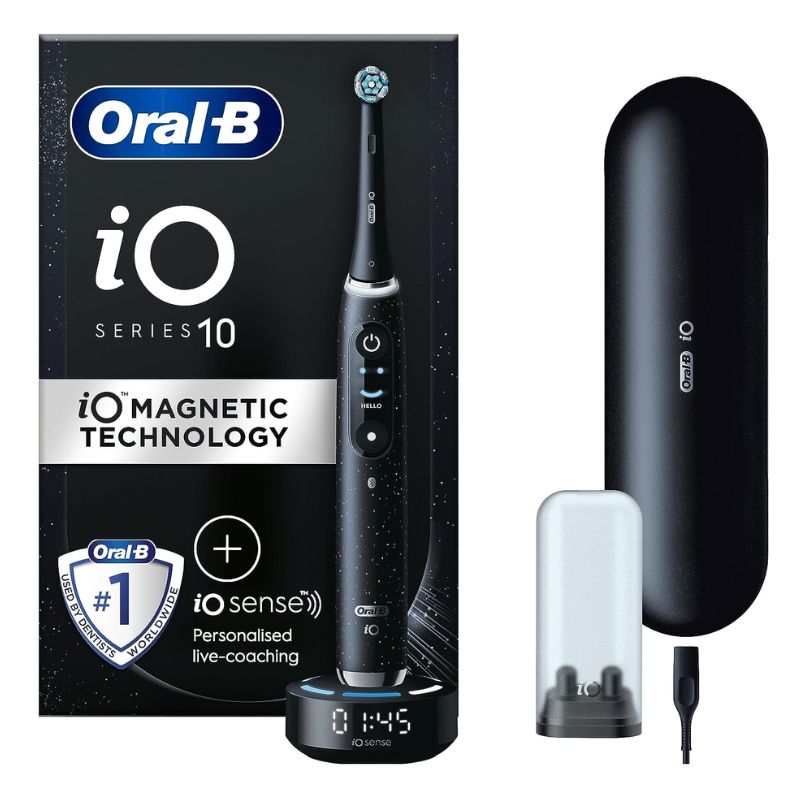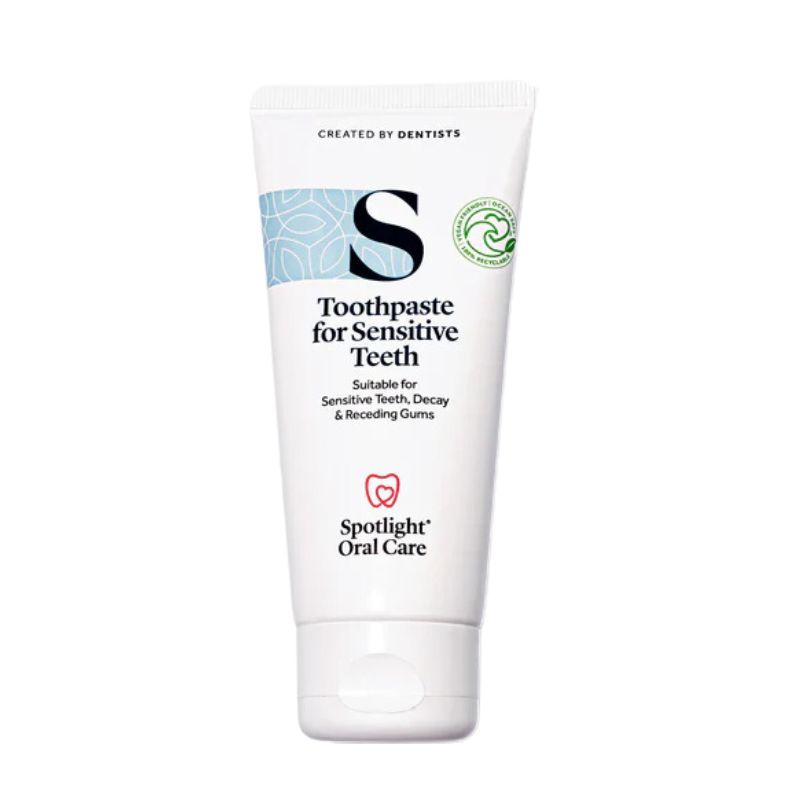4 sensitive teeth treatments for getting rid of pain at home, recommended by dentists
Sensitive teeth treatments don't have to be done in the dentist's chair. Dentists recommend these for those who want to know how to get rid of sensitive teeth at home


Understanding sensitive teeth treatments and knowing how to get rid of sensitive teeth is the dream if you're struggling to simply bite into an ice cream or enjoy your regular morning coffee without a sharp, tingling pain.
The sensations you get when sensitivity strikes make it feel like there’s pain shooting right through your tooth. Even if you use one of the best electric toothbrushes, designed for this exact problem, it will still be a problem if it is severe enough.
"When you have tooth sensitivity, usually it's not an exposed nerve unless you have a broken tooth or a huge cavity. It's the exposure of the dentin or cementum," says Dr Casey Lau, a chief dental officer at Elims. "When the tooth is exposed to something irritating like a hot, cold, sweet, acidic drink or food, messages are sent to the nerve through the dentinal tubules."
However, some sensitive teeth treatments simply involve lifestyle interventions - with some help from professionals - once you answer the question of 'why are my teeth so sensitive?'. Here, woman&home speaks to several specialist dentists to reveal how to lessen the pain and get back to your normal habits.
Sensitive teeth treatments
1. Don't brush your teeth so hard
Two of the most common causes of sensitivity are brushing your teeth too hard or using a harsh toothbrush, says Dr Mahnaz Rashti, periodontist and cosmetic surgeon. So, using an electric toothbrush with a pressure sensor - like one of the best Oral-B electric toothbrushes - will likely help you brush your teeth properly.
“We always want to encourage patients not to brush so hard and adopt the correct brushing technique,” explains Dr Saul Konviser of Montagu Dental. “If using an electric toothbrush, let the brush do the work for you and don’t do additional scrubbing.” Choose a brush with a pressure sensor that alerts you if you’re getting carried away.
You could also try opting for products that remineralize your teeth. Instead of your run-of-the-mill toothpaste, Dr Lau suggests trying “calcium phosphate products derived from milk” and prescription-grade “fluoride-containing toothpaste to strengthen the teeth". These sit among the best toothpaste overall, recommended by dentists for teeth sensitivity and better overall oral health.
Sign up for the woman&home newsletter
Sign up to our free daily email for the latest royal and entertainment news, interesting opinion, expert advice on styling and beauty trends, and no-nonsense guides to the health and wellness questions you want answered.

The Oral-B iO10 electric toothbrush is an excellent option for those needing a little care in their brushing routine. Along with two specific modes for sensitive teeth, the iO10 has a 360-degree pressure sensor around the head that flashes red, green, and white to signal your brushing pressure, with interchangeable heads offering sensitive teeth a break from hard brushing.
2. Try toothpaste for sensitive teeth
If you have receding gums, part of your cementum will become exposed. As Dr Konviser puts it: “It’s like going out in winter without a jacket - suddenly you will be very exposed and sensitive. Gum recession is similar in that the gums provide insulation to the teeth. Without them, the teeth are more exposed to the elements.”
Gels and toothpaste products targeted at people with sensitive teeth work by “putting up a protective chemical barrier over the exposed areas of the tooth,” Dr Konviser explains. They can be one of the best sensitive teeth treatments. “Many of the over-the-counter toothpaste are very effective, yet sometimes patients require more and so stronger, prescription-only gels and pastes can be issued.”
If teeth are sensitive, be wary of trying to learn how to whiten teeth at home, as these products can often be detrimental to tooth enamel.
"In cases of more extreme sensitivity, soft tissue grafts for gum recession may be needed," says Dr Rashti. In all cases, talk to your dentist about how gum grafts work, and what to expect in terms of treatment time and cost.

Our pick of the best toothpaste for sensitive teeth! Spotlight's Oral Care Toothpaste for Sensitive Teeth contains Potassium Citrate, Tricalcium, Phosphate, and Fluoride - three ingredients that can help reduce tooth sensitivity when you use this toothpaste every day.
3. Change your diet
“Acidic foods can demineralise and damage your teeth,” Dr Lau says. “Your teeth are made up of a mineral called hydroxyapatite. When it is worn away through normal wear and tear or it is exposed to acids and eroded, you expose the dentin.” Using mouthwash can also help keep your teeth and gums cleaner, not to mention banishing unpleasant halitosis.
A sugary diet can also contribute to this breakdown. “When you have sweets, you feed the bacteria in your mouth and this releases acids that cause further damage,“ he says.
Cutting your soda-sipping habit or daily dessert routine can make a big difference in keeping your teeth healthy and it can be one of the best sensitive teeth treatments to do at home. Stay away from foods high in artificial sugars and sweeteners, such as:
- Fizzy drinks
- Baked goods
- Candy
- Chocolate
- Jams
- Jelly
If you do consume sugary foods, make sure you brush straight after. No matter how much acid and sugar is in your diet “good home care is a must,” says Dr Lau. “Regular brushing and flossing will keep bacterial loads down and prevent decay and acid released by the bacteria.” That means brushing twice a day and flossing daily.
This could also help restore the colour of your teeth if you're finding that your teeth are turning brown or yellow recently.
4. Wear a night guard
"Bruxism, or teeth grinding at night causes micro-cracks in the teeth or fillings that may be worn around the edges," says Dr Konviser. These tiny fractures can expose the inner layers of your teeth to factors that cause sudden sensitivity.
The solution is wearing a night guard when you sleep. "Wearing a night guard can help protect the teeth and prevent further wear and risks of fractures that can result in sensitivity," suggests Dr Konviser.
When to see a dentist
“If patients experience sensitivity, I recommend they speak to their dentist as soon as possible. We have many conservative and non-invasive techniques that we can use to help manage the problem,” Dr Konviser says.
For those looking to learn how to get rid of sensitive teeth, it's important to note that a dentist must carry out some sensitive teeth treatments in a clinic. They can't all be done at home.
“Often, a tooth that has had a filling becomes sensitive out of the blue and this is often due to the nerve beginning to ‘die off,’” he adds, so it's a common problem.
“This type of sensitivity can often lead to new fillings or, at worst, root canal treatments if the nerve is so inflamed or irritated,” he notes. Although the prospect of this treatment type is often the last thing many want, it’s important to be open and honest with your dentist about your symptoms and concerns.
Dr Casey Lau is a dentist specialising in dental implants, surgery, cosmetic dentistry, restorative dentistry, as well as preventative care. After two decades in dentistry, the UCLA-educated doctor is constantly evolving and innovating both personally and professionally.
Dr Mahnaz Rashti leads a world-renowned practice in Beverly Hills. While Dr. Rashti, DDS, is widely known for her talent and abilities as a cosmetic dentist, her patients admire her compassionate nature, attentive approach, and personable connections that she fosters in every interaction.
Dr Saul Konviser BDS MSc BSc is the lead general dentist at the Montagu Dental practice. Originally from Cape Town, South Africa, Saul completed his Bachelor’s degree in Physiology & Pharmacology at Bristol, University of the West of England and went on to study for a Masters in International Healthy Policy at the London School of Economics, spending time in Canada and South Africa as part of his research projects.
Ciara McGinley is a meditation practitioner and health journalist. She qualified as a meditation teacher with the British School of Meditation in 2020 and is the founder of Finding Quiet, a series of classes, workshops and retreats that combine meditation practices and mindfulness techniques to make mindful living realistic in an always-switched-on modern world. She is all about bettering that mind-body connection but believes wellness looks different to everyone.
Ciara is also the former Health Channel Editor at woman&home and has covered all things health and wellbeing for years, from fitness to sleep to relationships.